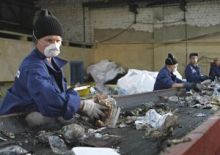The International Forum ECO-invest-2012 started in Kyiv. Den performs as its information partner. During three days participants of the forum will discuss implementation of new models of collecting, sorting and recycling of solid domestic waste in Ukraine and will also study possibilities of using waste in energy. Before the forum The Day discussed the main problems of the development of the solid domestic waste market with the director of the state enterprise Ukrekoresursy Dmytro RADIONOV.
What are the main tendencies of the solid domestic waste market in Ukraine?
“The main tendency is creating the civilized market. In fact, it is a very powerful market; there are so many wastes on it and very few people investing into their recycling that we cannot speak about any serious competition. If we have a look at capacity rating of enterprises recycling wastes in Ukraine we will see that only 7 percent of raw materials are collected from garbage compared to 75 percent in Europe. Our task is to make at least 15 percent of wastes be recycled in Ukraine. This is one of the main tasks of the state enterprise Ukrekoresursy as the only legal economic entity that provides the system of collection, storage and recycling of used containers, packing materials and domestic waste as recyclable materials. Now we are working to create a special exchange to sell recyclable materials. Such market participant would significantly simplify the search of suppliers and clients.”
What hinders today to actively develop the “garbage business” since it is a gold mine all over the world?
“The key factor that hinders the development is the absence of infrastructure of collecting, storing and recycling for solid domestic waste in separate territories and in the hole country in general. Cities or regions that have full cycle from containers for separate collecting to lines of recyclable materials processing can be counted on fingers, though there are a lot of enterprises on this market, at least, five to seven in every region. However, as for really powerful market players, there are only five to seven of them all over Ukraine. The ideal structure of the market is the following: to process each type of recyclable materials a region needs at least three to five medium-sized enterprises (thus the market will be competitive) and one-two powerful market players for several regions to provide the full waste recycling.
“One more barrier are problems caused by the actions of local authorities, for example, delaying allocation of lots of land for enterprises. Besides, our people are very unconscious. Even if we place containers for separate waste collection we have to explain people how important it is to do it. Meanwhile, in Germany (and some other European countries) people have to sort garbage according to the law and they are heavily fined for not doing it.
“However, these are temporal barriers, intrinsic to any developing market.”
How should the legislation be changed to make this market actively develop?
“It is essential to adopt three bills. The first one should be on implementation of obligatory construction of waste recycling plants and complex action to reduce garbage dumps; the second one – on including the component of separate collecting and recycling of waste into the rate; and the third one – on giving the status of green energy to biogas produced on garbage dumps or when eliminating solid domestic waste.”
What is Ukraine’s potential in using recyclable materials from domestic waste?
“In my opinion, the prospects of the waste recycling market directly depend on the market of collection and storage of solid domestic waste. The more efficiently technologies are implemented, the more recyclable materials we get. More recyclable materials will encourage the competition between market players leading to cheaper resources and their wider use in everyday life. Thus the prime cost of products decreases and recycling grows.”








